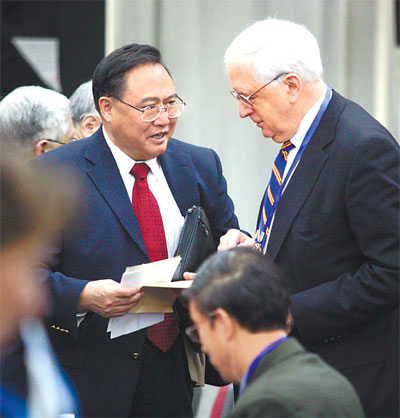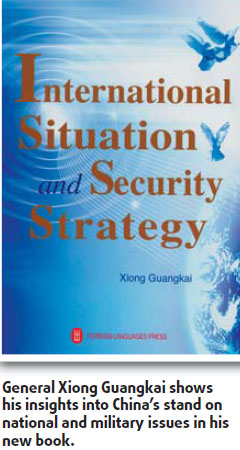 |
|
Xiong Guangkai with J. Stapleton Roy, former US ambassador to China, at an international forum, China's Peaceful Development and Harmonious World, in Beijing in November, 2007. [Wu Zhiyi] |
When a book comes out in more than one language, it is not difficult to tell which version is more important: The one the author writes in is usually considered "the official version".
Maybe so. But in the case of Xiong Guangkai, the English edition could well be more valuable - even though the Chinese one is definitely more "official".
That is because of Xiong's unique stature. He is chairman of the China Institute for International Strategic Studies and holds the military title of "general". But he is also a guest professor with several prestigious schools of higher learning, including Tsinghua, Peking University, Shanghai Jiaotong, PLA National Defense University and PLA University of International Studies.
Before he retired from his military post as deputy chief of the PLA General Staff, he was a senior consultant to national policy-making, which took him to the inner circle of the real action. He understands how China's leaders interpret world events and how national security policies are formulated.
Yet, the ultimate insider exhibits the kind of objectivity associated with a scholar as he can look at things from the perspective of an observer and analyst. And he knows how to explain to outsiders in a language they can understand. That gives him all the insights but none of the prejudices, which add to the gravitas of the writing. And that is why the English version of "International Situation and Security Strategy" may have a special appeal to those China watchers who specialize in reading tea-leaves.
For the past decade, General Xiong has been publishing a year-end assessment of the "international strategic situation" at the end or beginning of every year. Besides, he is an active speaker around the country - and the world - and expounds China's stand on national and military issues. Many of these articles and speeches have found their way into this collection. What is truly amazing is that none of them needed "updating" during the editing process because, as General Xiong says, he did not write for specific occasions and therefore his writings have stood the test of time.
He is proud he took a "comprehensive and long-term view" of the international strategic situation back at the dawn of the new century. He believed that peace and development would remain the two major themes of the century, and China would face more opportunities than challenges. "Multi-polarity" would hit bumps but still be the trend, he argued. Economic globalization would have its quirks, but was "unavoidable", he noted. He also emphasized the function of technology and "the revolution in military affairs".

General Xiong derives his interpretation of China's international strategy from his understanding of the country's geopolitics. "The world is not flat, only part of it has been flattened," he says. A country does not simply make policies out of interests alone, but has to consider both its interests and the power it possesses.
When he touches upon the topic of national security, it is not limited to traditional areas, such as a military threat. Even a decade ago, General Xiong was talking about "non-traditional security issues" like economy, energy, public health and information system, among others. Even tasks for the military have been expanded, according to Xiong, to include non-military endeavors.
Last year's lightning-fast response to the Sichuan earthquake is a perfect example of using the military in a non-traditional and non-military capacity, he says.
In a 2003 speech, General Xiong elaborated on the "revolution in military affairs", which, as he quoted Jiang Zemin, should have "Chinese characteristics". He made a detailed study of all the weapon systems used in the Iraq war by the US, coming to the conclusion of "connecting this world trend closely with our national reality" and "building a leaner but better armed force".
General Xiong often uses "military building" and "diplomacy" in one sentence. What China needs right now, he says, is to focus on its economic growth. That's why our "independent diplomatic policy" is not just for the short term. Our military building is purely "defensive", he emphasizes, and will need the full cooperation of the international community.
Xiong's speeches and articles are choke-full of valuable data, but in a sit-down interview he reveals something lighter. He mentions a discussion he held with several of the nation's top translators about a word the late leader Deng Xiaoping used as a guiding principle for China's relations with the world.
"Tao guang yang hui" is a term used by ancient strategists and is often translated as "hiding one's capacities and biding one's time". "Yang hui" is especially problematic because it can mean "lying low and concealing one's true intentions".
Xiong argues that such an interpretation, when used for China's foreign relations, could be misleading. China does not have any ulterior motives, he contends, and the reason we want to lie low is to maintain peace and harmony with everyone else.
In the end, Xiong and his fellow experts settled on an English phrase with a biblical connotation: hiding its light. And that, he believes, reflects Deng Xiaoping's true intention in guiding China toward more sustainable peace and prosperity for all.
(China Daily May 19, 2009)